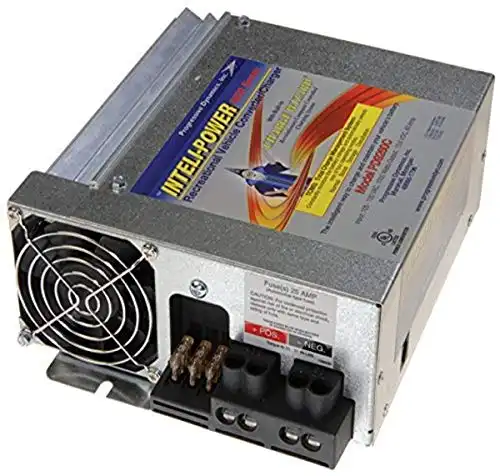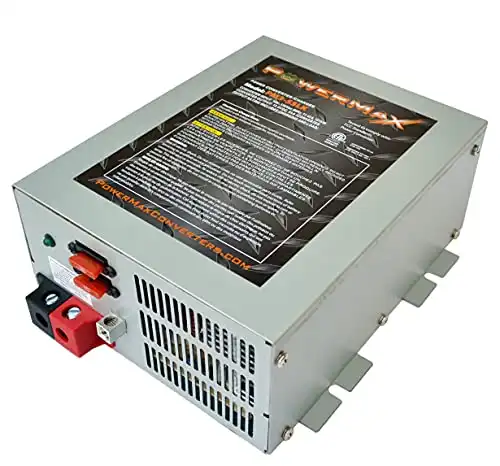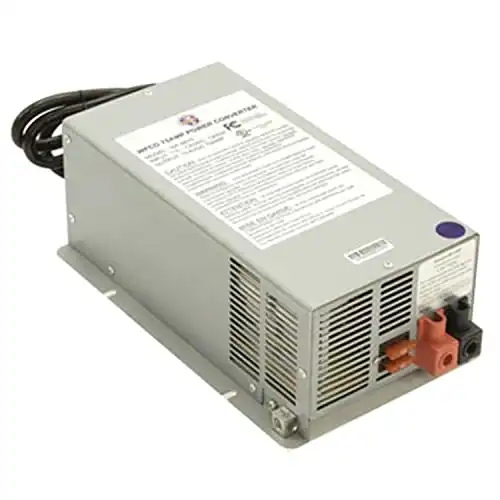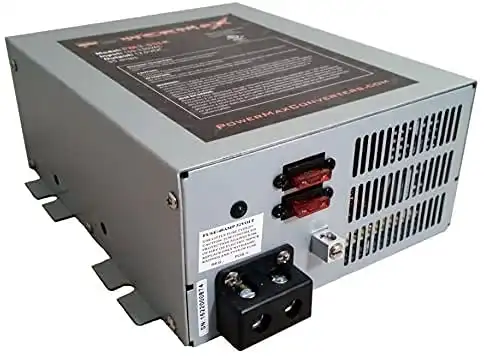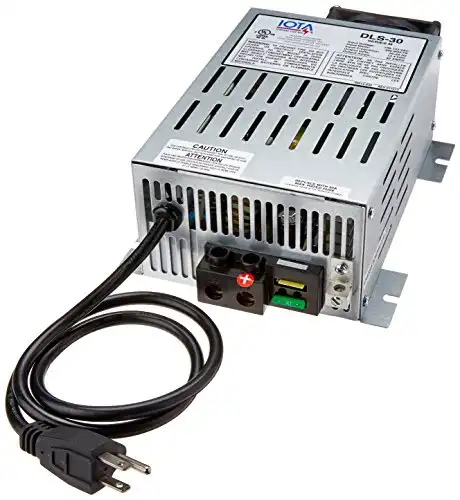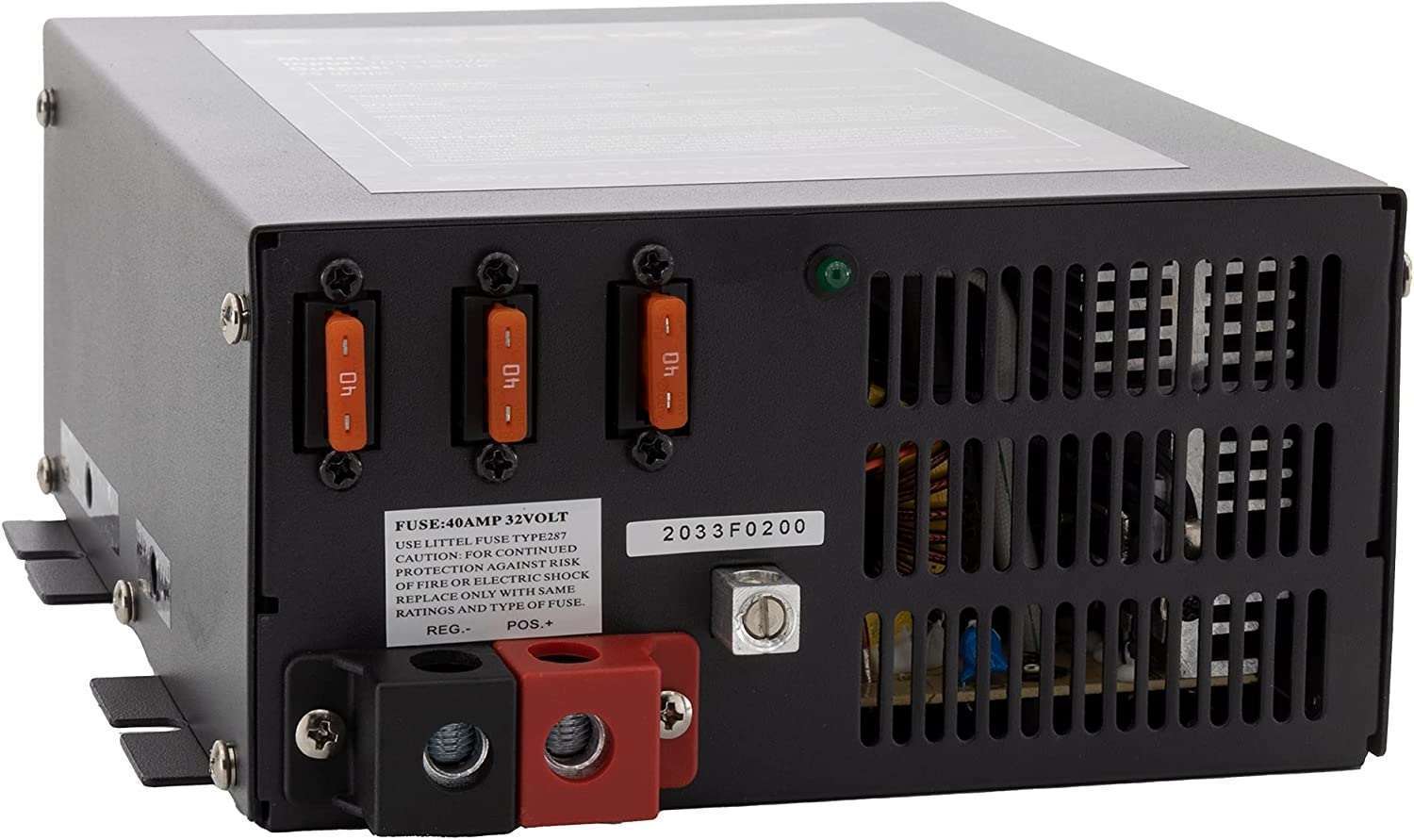
These are the 5 Best RV Power Converters in 2023
In this modern day and age, we continue using more and more electronic devices, even in our RVs. Some appliances are essential to your everyday life in an RV, while some are situational, but they still require power.
All these accessories require electrical power, which they get from the electrical system of your RV. As we all know, different appliances work on different levels of voltages, and that’s why you need a device that will help with the proper power regulation.
What is an RV converter?
An RV converter is a device that converts 120-volt alternating current (AC) electricity into 12-volt direct current (DC) electricity. It takes the AC power from the electrical hookup or a generator and converts it to DC power that can be used to charge the RV’s battery and power DC appliances.
Without a working power converter, our life in an RV would be very different. In fact, our 12V power system would be pretty useless without a working power converter.
How does an RV Converter work?
When you plug your RV into any standard electrical source, the converter reduces 120V AC power to 12V DC power. The DC power is then distributed to the RV’s electrical system, powering the DC appliances and charging the battery. In newer RVs, converters supply power to all of the 12-volt appliances and accessories in your rig.
If your RV isn’t connected to shore power or another electrical source, your RV battery will supply the power to all 12-volt appliances and accessories.
If you’re connected to shore power or some other electrical source, a converter recharges your batteries, which preserves the lifespan of your batteries.
A converter works as a standard feature or an easy plug and play. It is necessary if you plan on utilizing your DC appliances or accessories. Remember, your batteries will still drain even if you are plugged into standard shore power.
A converter keeps your batteries charged, but not all converters work the same.
Types of RV Converters
There are two main types of RV power converters: single-stage converters and multi-stage converters. Among the less used types of RV power converters are high output converters, deck mount converters, and distribution panel converters. In this article, we’ll focus on single-stage converters and multi-stage converters.
- Single-stage converters
Single-stage converters are the simplest type of RV power converter. They take the 120V AC power from a shore power connection or a generator and convert it directly to 12V DC power to charge the RV’s battery and appliances. Single-stage converters are really simple to use and they are affordable, but they don’t regulate the charge rate of the battery, which can lead to overcharging or undercharging, potentially damaging the battery.
- Multi-stage converters
More advanced and efficient than single-stage converters, multi-stage converters are designed to provide a three-stage charging process that ensures the battery is charged correctly and efficiently.
Those three stages are:
- Bulk charging: In this stage, the converter delivers a high amperage charge to quickly recharge the battery.
- Absorption charging: In this stage, the converter delivers a lower amperage charge to bring the battery to a full charge and prevent overcharging.
- Float charging: In this stage, the converter delivers a very low amperage charge to maintain the battery’s full charge without overcharging it.
Multi-stage converters are more expensive than single-stage converters, but they are more efficient, reliable, and overall better for the battery’s health. They can also be programmed to work with different types of batteries, such as lead-acid or lithium-ion batteries.
Things to consider when buying an RV Converter
- Output size
- Converter type
- Product efficiency
- Battery power
- Your appliances
- Operating time
- Safety protocols
What are the benefits of using an RV Converter?
Using an RV converter leads to a number of benefits, including:
- Efficient use of power – An RV converter is designed to convert 120V AC power to 12V DC power. This enables the RV’s battery to power the DC appliances and devices without the need for an external power source, which can save energy and reduce the cost of electricity.
- Battery charging – An RV converter has a built-in charger that charges the RV’s battery when the RV is connected to shore power or a generator. This ensures that the battery is fully charged and ready to power the RV’s DC appliances and devices when shore power or generator power isn’t available.
- Protection – An RV converter is designed with a range of safety features, such as over-current protection and reverse polarity protection, which helps protect the RV’s electrical system from damage caused by power surges or other electrical issues.
5 Best RV Power Converters
Now that we’ve summarized what you need to know about RV power converters, let’s review the 5 Best RV power converters on the market.
A favorite choice among RV owners, this Progressive Dynamics converter offers protected DC power to all lighting circuits and 12-volt appliances in your RV. This 60-amp converter will charge your RV’s battery in no time. It also comes with a Charge Wizard, which automatically adjusts the charging rate to the condition of your battery.
- Built-in Charge Wizard constantly monitors voltage status and automatically adjusts the charging rate
- Reverse battery protection protects the converter from damage
- High and low voltage protection
- The cooling fan automatically monitors the converter temperature at all times
- Quiet during sleeping hours
A compact and efficient converter that delivers 55 Amps of DC power. With a built-in smart charging system, it automatically adjusts the charging voltage and current. Easy to install and easy to carry, it is one of the most popular options on the market. PowerMax converter offers superior performance and protection against reverse polarity, overload, and overheating.
- 55 Amp DC Power Output
- Built-in 4 stage Smart charger
- Quiet during sleeping hours
- Made out of quality materials, extra durable
- Easy to carry and install
- Temperature-controlled fan cooling system
- 75 Amp of clean and reliable DC power
- Deadly quiet
- 3-stage battery charging process prolongs the lifespan of your battery
- Super easy to install
- Built-in protection against overload or short-circuit situations
- Works with both lead and lithium batteries
- LED lights indicate the status of the converter
- Simultaneously charges your RV’s battery while providing power to your electronic devices
- Available in different capacities, from 35 to 100 Amps
- The 3-stage charging battery process protects the lifespan of the battery
- Extra quiet cooling fan
Ideal for smaller campers, the IOTA converter provides an output of 30 Amps. Small and light, it is easy to install and can fit anywhere. Cost effective (almost half the price of other converters) and reliable, it comes with a 2-year warranty. It protects your equipment and ensures an exceptionally clean DC output.
- Lightweight and small fits anywhere
- Provides exceptionally clean DC power
- The best price on the market
- Great to use if you have more than one battery
- You can directly charge lead-acid batteries
What Causes an RV Converter to Go Bad?
There are several reasons why an RV converter can go bad. Here are some of the most common causes:
- Circuit board or breakers
- Resistors or diodes
- Fuse
- Power Source
In our previous article, we’ve explained in depth how to find the reason for your RV converter not working properly. If your converter stops working, your appliances won’t work either: your lights, your vents and fans, your refrigerator, and onboard batteries, they all draw power through your converter.
When you learn how an RV’s electrical system works, you will be able to deal with RV converter issues by yourself. If you want to find out what causes an RV Converter to go bad, read more about it here.
Final thoughts
If you want to properly charge your batteries, think about investing in a good RV converter. Not only will it preserve the lifespan of your battery, but it will serve as a protector against power surges, overloads, and other hazards. Converters usually last from 5 to 10 years and they are a great investment that will save you money in the long run. Apply what you’ve learned here and we have no doubt you’ll find the best RV converter for yourself. If you have any questions, our team at CheapRV.com will gladly answer them.
